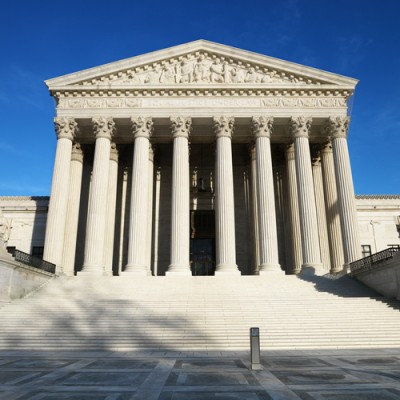ABA urges SCOTUS to invalidate president's travel ban

The American Bar Association filed a friend-of-the-court brief Monday asking the U.S. Supreme Court to permanently block President Donald Trump’s executive order on immigration from six majority-Muslim countries.
The brief (PDF) is about the substance of the travel ban, which the Supreme Court will hear Oct. 10. Trump’s revised travel ban, issued in March, banned the entry of nationals of Sudan, Libya, Iran, Somalia, Syria and Yemen for 90 days. It also banned admission of refugees from any nation for 120 days.
The stated reason was to permit the Department of Homeland Security to review screening and vetting procedures for those foreign nationals, and the order permitted agencies to waive the ban at their discretion. But the International Refugee Assistance Project, the state of Hawaii and others sued the president, alleging that the order was actually a product of animus toward Muslims. They argued that the ban violates the Immigration and Nationality Act and the First Amendment’s prohibition on religious discrimination.
Federal appeals courts for both the 9th Circuit and the 4th Circuit affirmed lower court rulings blocking the ban. The Supreme Court agreed in June to take the two consolidated cases.
In its current amicus brief, the ABA emphasizes limits on presidential power. The government had relied on 8 U.S.C. 1182(f) in the Immigration and Nationality Act, which says the president may “suspend the entry of all aliens or any class of aliens as immigrants or nonimmigrants, or impose on the entry of aliens any restrictions he may deem to be appropriate.” The federal government has argued that this language makes the executive order unreviewable by the courts, but the ABA rejected that idea.
“Deference does not justify abdicating the duty of judicial review,” the brief says. “Accepting the government’s position would eviscerate the most fundamental task of this court: to say what the law is, even when that law touches on sensitive subjects like foreign relations and national security.”
Nor, the ABA argues, is the federal government correct about what powers that section of the INA gives to presidents. If read the way the solicitor general’s office is suggesting, the brief says, 1182(f) would negate the INA’s vetting procedures and its ban on national-origin discrimination. Such a reading, the brief says, would also permit presidents to grab power from Congress, to which the Constitution gives power over immigration matters.
Finally, the ABA briefly argues that if the high court reaches the question of whether the travel ban violates the First Amendment—which the 9th Circuit did not, although the 4th did—the court should be free to examine the president’s public statements outside of the text of the order itself.
“When the president and his advisers themselves casually acknowledge their intent to implement a ‘Muslim ban,’” the brief says, “the threat to our constitutional values requires nothing less.”
According to SCOTUSBlog, dozens of other amicus briefs have been filed in the high-profile case, including briefs from religious organizations, legislators, scholars and other groups.
The case is separate from the dispute over how refugees and relatives of U.S. residents should be treated during the pendency of the Supreme Court case, on which the Supreme Court made a ruling last week. That ruling permits the order’s ban on refugee admissions, even those working with U.S. refugee resettlement organizations, but does not disturb an order widening the categories of relative from the six named countries that are exempted from the travel ban.



